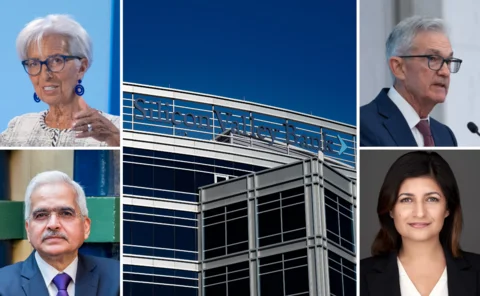Financial crisis
The risks facing the Chinese economy
China isn’t at risk of a financial meltdown, but it does face a slow puncture, writes Michael Taylor
US monetary policy drives defi credit cycles, HKMA study finds
Automatic liquidation could amplify shocks and trigger runs, author say
2023: The year in central banking
Central Banking’s most-read story this year dissected the crisis at SVB, while other top pieces delved into operating frameworks, third-party risks and international economics
Finma calls for more powers after Credit Suisse failure
Swiss central bank head had wanted to nationalise the failing global lender
Riskiest non-banks shrink for first time since 2009
FSB says narrow measure of riskiest firms fell in 2022 as asset price falls hit investment funds
Credit lines can amplify stress – NBER paper
Study finds junk-grade firms draw more credit, and drawdowns can worsen liquidity shocks
Obstfeld argues central banks’ rate models are ‘conceptually flawed’
Former IMF chief economist says rates could soon return to the effective lower bound
Sooner or later, Argentina should dollarise
Dollarisation would be straitjacket, says Steve Kamin, but still looks preferable to the other options
Managing reserves amid climate change and home-shoring
Central banks can still make asset allocations with solid climate outcomes, despite slippage in the net-zero timetable, writes Gary Smith
FSB warns of spillovers from ‘multifunction’ crypto firms
High risks and poor governance in crypto sector could impact traditional finance, report says
Argentina’s Milei struggles to find central bank governor
Two candidates refuse position amid uncertainty over dollarisation plans
Eurozone banks show “early signs of stress”, ECB warns
High interest rate will test eurozone’s resilience while some non-banks are at risk, review says
Defending the basis
Benefits of additional Treasury liquidity may outweigh potential intervention costs during a hypothetical panic, writes Joseph Wang
Geopolitical risks threaten financial stability – Norges Bank
Norwegian central bank says banks are well-capitalised but notes real estate problems
Data sharing as a policy intervention
Increasing access to data represents another policy lever regulators can pull to achieve their objectives, writes David Bholat
Claudio Borio on financial cycles, operating frameworks and non-bank reform
The BIS veteran highlights a ‘unique constellation’ of challenges as central banks travel the ‘last mile’ in bringing down inflation – and says there are many more miles to go on non-bank reform
Book notes: The economic government of the world 1933–2023, by Martin Daunton
A deep dive into the politics, personalities, trade theory and trade practice of the era, but missing a crucial element: the collapse in the US stock of money
The predicament of bloated central bank balance sheets
Swollen balance sheets carry significant risks for combating inflation, ensuring financial stability and preserving central bank credibility, independence and effectiveness. How can central banks reduce them?
Decentralised finance has outpaced regulation – ECB paper
Technology with ‘no legal personality’ poses financial stability risks
IMF economists build financial stress index for 110 countries
Text-based method allows economists to assess both duration and intensity of financial crises
Default fears loom over Country Garden
The Chinese developer reportedly missed a final deadline to repay $15.4 million in interest
Carstens: Regulatory performance during banking crises was ‘mixed’
BIS general manager emphasises role of supervision in preventing bank failure
Rate hikes: too much, too late – and now too dangerous
Why monetary tightening risks a global credit crunch
Basel III implementation is behind deadline, says committee
Only a third of member jurisdictions have adopted standards























